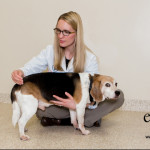The Science Behind the Dog/Human Bond
For all us pet owners who consider our pets our family members, the scientific proof of the strength of the dog/human relationship won’t come as a surprise. Some of the findings on why dogs and humans have such a strong relationship, from the May/June issue of the Scientific American Mind:
• Dogs and their owners form “attachment relationships,” similar to moms and their babies.
• Dogs have adapted well to living with their human families because of their “attentiveness and their sensitivity to human modes of communication and emotional behavior.” Dogs express their emotions vocally, just like people (who among us can’t distinguish that “let me out now bark”) and they seem to understand the nuances of our verbal communications.
• Dogs have figured out how to behave in order to elicit responses from their owners. (My cats have figured that out too, e.g., knocking over the water glass on my nightstand every morning in order to wake me up. They clearly are smarter than I, as I still keep a water glass on the nightstand.).
• Dogs are very observant and are able to apply what they’ve learned to follow family rules.
All of this makes them unique in the animal kingdom, as they’ve essentially found a way to join a species alien to them—us. This shows that they have sophisticated social competence, which psychologists define as “the ability of individuals to harmonize their needs and expectations with those of the collective, letting them fit in with the group.” Applying this to my dogs:
• form attachments (in the house, they’re almost always near one of us);
• regulate aggression (living harmoniously with three cats);
• learn and follow rules (hmm, not so sure about this one, as I repeatedly tell one of my dogs to not be underfoot when I’m cooking. He says “See the first point about attachment.”); and,
• provide assistance and participate in various group activities (one of my dogs will never let my son go outside to play without him).
Studies comparing wolves and dogs show this social competence is unique to dogs. Over the centuries of living with humans, dogs’ genes have changed fairly significantly, giving them humanlike social competence when raised among people. I, for one, am very glad of it.
To learn more: www.mind.scientificamerican.com
Ellen Zangla Photography—Specializing in pets and the people who love them.



